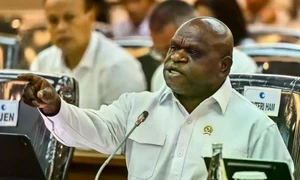
(AP) Iraq's parliament gave its vote of confidence to a new Cabinet on Thursday, breaking a yearlong political stalemate. It's the first government since 2005 that doesn't include members from the bloc of a powerful Shiite cleric.
A majority of the 253 lawmakers present voted to appoint 21 ministers, with two posts — the Construction and Housing Ministry and the Environment Ministry — remaining undecided. Despite those two unresolved appointments, the approved Cabinet lineup constitutes a quorum.
The Cabinet headed by Prime Minister Mohammed Shia al-Sudani is the first since 2005 that does not include seats for the bloc of influential Shiite cleric Muqtada al-Sadr.
Iraq held early elections more than a year ago in response to mass anti-government protests that began in October 2019 in Baghdad and across southern Iraq. Protesters called for the overhaul of the political system established after the 2003 U.S.-led invasion.
Following the election, which gave a plurality to the alliance led by al-Sadr, political infighting delayed the forming of a government for more than a year. This was driven largely by a political rivalry between al-Sadr and Iran-backed former Prime Minister Nouri al-Maliki.
Al-Sadr’s bloc withdrew from the parliament amid the stalemate. In July, following the nomination of Mohammed al-Sudani for prime minister by Iran-backed parties, followers of al-Sadr stormed the heavily fortified Green Zone and the Iraqi parliament.
The following month, street fights between followers of al-Sadr and members of the rival Popular Mobilization Forces left at least 30 people dead and dozens more injured. Following the clashes, al-Sadr withdrew his followers from the parliament.
After their withdrawal, al-Sadr’s rivals in the Coordination Framework group led by al-Maliki were able to form an alliance with Kurdish and Sunnis parties on forming a government.
On Oct. 13, Iraqi lawmakers elected former minister Abdul Latif Rashid president, following a barrage of rocket attacks earlier in the day, in a first step toward naming a new government.
The lead-up to Thursday’s vote was marked by anxiety about more potential violence, but the streets of the capital remained quiet.
Independent lawmaker Raed al-Maliki said he anticipates that al-Sadr will wait to observe the public's reception of the new government before reacting.
“I expect that street protests will begin if this government doesn’t succeed,” he said, noting that the new Cabinet will face “major challenges in terms of reforms, combating corruption, climate change and unemployment.”
Along with the Cabinet post appointments, parliament approved a program that includes amending the elections law within three months of the ministers being sworn in, with early elections to be held within a year after that. The document also calls for measures to fight corruption, speed up reconstruction of areas damaged by armed conflict and return the displaced to their homes. It also calls for the elimination of “uncontrolled weapons” held by non-state actors.
Al-Sudani said ahead of the vote that the new government will combat “the epidemic of corruption that has affected all aspects of life ... and has been the cause of many economic problems, weakening the state’s authority, increasing poverty, unemployment, and poor public services.”
He also promised the Cabinet will work to build the capabilities of local governments and to “find sustainable solutions to the outstanding issues with Iraq’s Kurdistan Regional Government through a true partnership based on rights and duties.”
Former Prime Minister Mustafa al-Kadhimi, speaking after the vote, defended his own government’s record and urged all political blocs to “support every endeavor of the new government on the path of stability and growth and defending democracy and human rights.”
On Friday in New York, U.N. Secretary-General Antonio Guterres welcomed the formation of a new Iraqi government, taking note that women hold three of the 21 ministerial positions, and expressed hope that the remaining two Cabinet posts will be filled swiftly, U.N. spokesman Stephane Dujarric said.
“The secretary-general urges the new government to deliver on the longstanding demands of the people of Iraq for reform, accountability and a better future,” Dujarric said.























